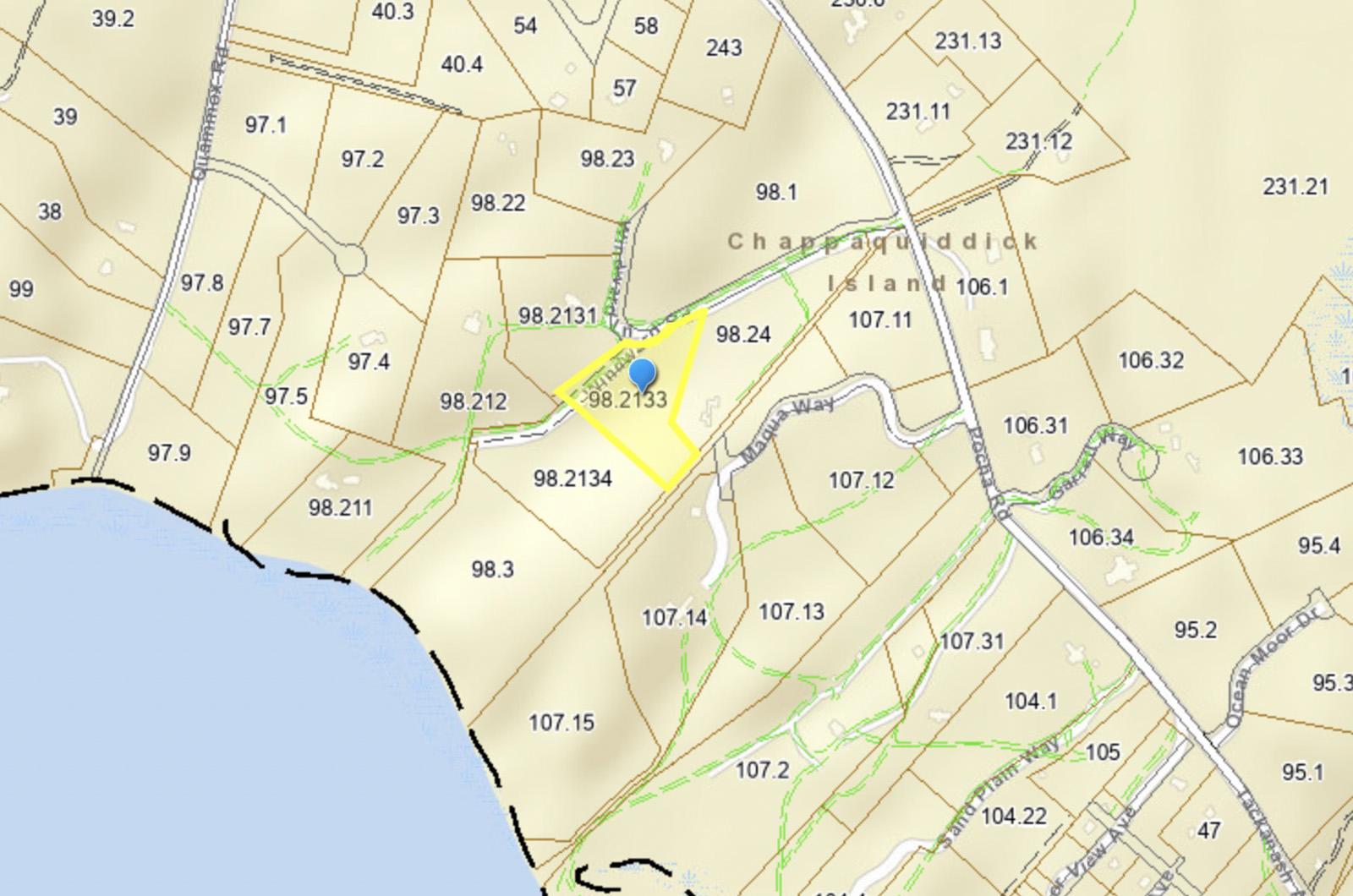In an unusual case that puts a spotlight on bargain land sales for conservation, four Chappaquiddick property owners are suing the Vineyard Open Land Foundation seeking to bar the nonprofit from selling a three-acre lot near Katama Bay that was set aside as open space nearly three decades ago.
A 30-page complaint was filed in the Massachusetts Land Court last week by three children of the late Vance Packard and his late wife Virginia Packard, along with a neighbor who was involved in the land transaction that dates to 1995. According to the court complaint, a conservation restriction was never recorded on the deed despite the clearly stated intentions of both the buyer (VOLF) and seller (Mr. Packard).
A trustee for VOLF who also represents the organization as its attorney said this week that the sale of the land is both legally permissible and necessary.
“[VOLF] is low on funds,” Eric Peters told the Gazette by phone on Wednesday. “We want to continue our charitable mission and in order to do so we have to liquidate.”
Vance Packard was an acclaimed journalist, author and social critic. Virginia Packard was a well-known artist and painter who had suffered a long illness. The Packards began summering on Chappaquiddick in the 1950s and later bought property in an area where sandplain grasslands, pitch pine and high bluffs rim the eastern end of Katama Bay.
A voluminous array of records filed in connection with the case, including typed and hand-written correspondence, document the circumstances surrounding Mr. Packard’s bargain sale of three acres of land to VOLF, a conservation nonprofit that has done a number of limited developments on the Island over the years, but none in recent years.
In the mid-1990s Mr. Packard and his neighbor Harold Wilmerding began communicating with VOLF about a plan to put three acres owned by Mr. Packard into conservation as a bargain sale, court records show. As part of the deal, Mr. Wilmerding would donate $100,000 to VOLF to pay for the purchase, and the three acres would conserved.
At the time Mr. Packard had seen his financial resources depleted by years of care for his wife, court records show, and his accountant advised against the discounted land sale. But Mr. Packard was adamant about putting his goal of conservation ahead of other concerns, the records also show.
“My accountant thinks that in dollar terms I am crazy; but in environmental terms I think the transaction makes sense,” Mr. Packard wrote in a letter to Mr. Wilmerding in November 1994 that is included in court documents.
The transaction was completed in 1995; Mr. Packard died the following year. Virginia Packard died in 1997.
The Packard children and the Wilmerdings still own their properties adjacent to the conservation lot. The complaint notes that the lot today lies near (though does not abut) other larger conservation tracts that have since been protected, including the Quammox Preserve owned by the Martha’s Vineyard Land Bank, and the Packard Preserve owned by the Sheriff’s Meadow Foundation.
Mr. Peters told the Gazette that VOLF had offered the property to the land bank three years ago but the land bank declined. He said Sheriff’s Meadow and the Chappaquiddick land acquisition committee were also notified of VOLF’s intention to sell, along with the Wilmerdings and Packards.
“We heard nothing . . . and in the fall of 2021 we decided to move forward with selling the property,” he said. “We feel that it has no intrinsic conservation value . . . the only benefit it provides is not a public benefit but a private benefit to the Wilmerdings and the Packards who abut the property.”
Mr. Peters confirmed and court records show that an actual conservation restriction was never placed on the Packard property. The deed was prepared by Mr. Packard’s attorney, Ivo Meisner, who was also chairman of the board at VOLF at the time.
“Plaintiffs expected that VOLF would honor its representations and preserve [the land] as undeveloped open space, and during the more than quarter century since the closing, VOLF has done so,” wrote attorney Lisa Goodheart in the complaint. “VOLF now intends to abandon its continuing responsibility to protect the locus from development . . . VOLF now contends that because the deed . . . did not include an express conservation restriction, VOLF is legally free and fully entitled to sell the locus on the open market.”
Calling the matter “an astounding breach of trust,” the complaint also says: “Either the conservation bargain sale is subject to rescission because it was fraudulently induced by VOLF, or VOLF must be judicially required to live up to its . . . commitment.”
Following a brief hearing Tuesday, the Hon. Diane Rubin, a justice of the land court, issued a memorandum of lis pendens, which effectively alerts would-be buyers of the property that its title is in dispute.
Mr. Peters said VOLF intends to file a motion to dismiss the case.
“The deed entitles us to sell the property,” he said. “We were able to hold it for 27 years, but times have changed.”






Comments
Comment policy »